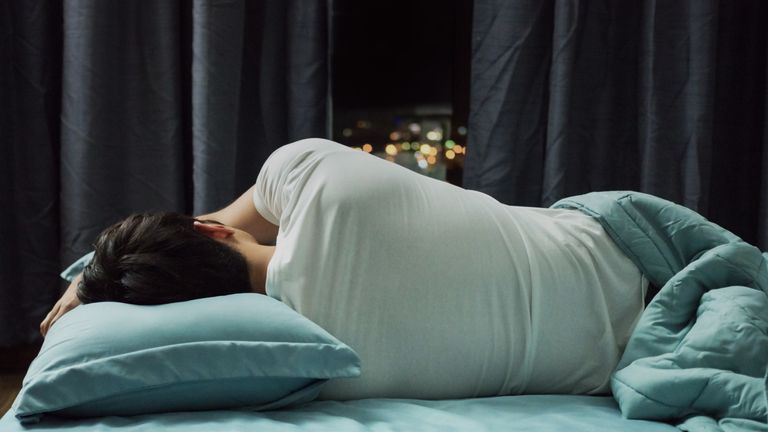Researchers say people who went to bed earlier improved their mental wellbeing and physical performance.
Monday 10 June 2019 11:31, UK
 |
| People felt less stressed when they went to bed early |
"Night owls" can re-adapt their body clocks in just three weeks to help them become early birds, a new study says.
Researchers say tweaks to the sleeping patterns of people who usually go to bed late could significantly improve their wellbeing.
People taking part in the study said they felt less stressed and depressed and did not feel as sleepy during the day when they tweaked their sleeping times.
Some 22 "night owls", whose average bedtime was 2.30am, with a wake-up time of 10.15am, took part in the study by Birmingham and Surrey Universities, and Monash University in Australia.
Over three weeks, those taking part were told to:
:: Wake up 2-3 hours earlier than usual and get plenty of outdoor light in the morning
:: Eat breakfast as soon as possible
:: Exercise only in the morning
:: Eat lunch at the same time every day and eat nothing after 19:00
:: Cut out caffeine after 15:00
:: Have no naps after 16:00
:: Go to bed 2-3 hours earlier than usual and limit light in the evenings
:: Maintain the same sleep and wake-up times every day
The results, published in the journal Sleep Medicine, showed an increase in cognitive (reaction time) and physical (grip strength) performance during the morning, while peak performance times moved from evening to afternoon.
Study co-author Dr Andrew Bagshaw, from the University of Birmingham's Centre for Human Brain Health, said: "Having a late sleep pattern puts you at odds with the standard societal days, which can lead to a range of adverse outcomes - from daytime sleepiness to poorer mental wellbeing.
"We wanted to see if there were simple things people could do at home to solve the issue.
"This was successful, on average allowing people to get to sleep and wake up around two hours earlier than they were before.
"Most interestingly, this was also associated with improvements in mental wellbeing and perceived sleepiness, meaning that it was a very positive outcome for the participants.
"We now need to understand how habitual sleep patterns are related to the brain, how this links with mental wellbeing and whether the interventions lead to long-term changes."
People who go to bed late suffer poorer mental wellbeing and often struggle to fit into work and school schedules that are out of sync with their preferred sleep patterns, say researchers.
Lead researcher Dr Elise Facer-Childs, from Monash University's Turner Institute for Brain and Mental Health, said: "By acknowledging these differences and providing tools to improve outcomes we can go a long way in a society that is under constant pressure to achieve optimal productivity and performance."